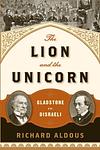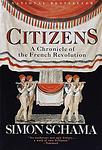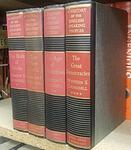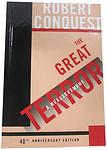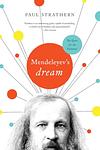The Greatest Belarusian, British "Nonfiction, History" Books Since 1950
Click to learn how this list is calculated.
This list represents a comprehensive and trusted collection of the greatest books. Developed through a specialized algorithm, it brings together 300 'best of' book lists to form a definitive guide to the world's most acclaimed books. For those interested in how these books are chosen, additional details can be found on the rankings page.
Genres
The category of "History" in books refers to the study and interpretation of past events, societies, and cultures. It encompasses a wide range of topics, including political, social, economic, and cultural developments, as well as the lives of individuals and groups who have shaped the course of history. History books can be written from various perspectives and may focus on specific time periods, regions, or themes. They aim to provide readers with a deeper understanding of the past and its impact on the present.
Countries
Date Range
Reading Statistics
Click the button below to see how many of these books you've read!
Download
If you're interested in downloading this list as a CSV file for use in a spreadsheet application, you can easily do so by clicking the button below. Please note that to ensure a manageable file size and faster download, the CSV will include details for only the first 500 books.
Download-
1. The Making of the English Working Class by E. P. Thompson
This book is a comprehensive historical analysis of the formation of the English working class from the late 18th century to the mid-19th century. The author meticulously examines various aspects of society including the Industrial Revolution, the rise of Methodism, and political movements, arguing that the working class was not a byproduct of economic factors alone, but was actively self-formed through struggles over issues like workers' rights and political representation. The book is widely regarded as a seminal text in social history due to its focus on the experiences and agency of ordinary people.
-
2. Ways Of Seeing by John Berger
This book is a seminal work of art criticism that challenges traditional Western cultural aesthetics by examining the ways in which we culturally learn to view art, particularly the impact of modern mass-reproduction on our experience of seeing. The author argues that the context, or "gaze," through which we perceive art significantly affects its meaning and our appreciation of it. The book also explores the portrayal of women in art and society, the relationship between art and ownership, and the connection between historical context and visual perception. It is a provocative critique that encourages readers to reconsider the role of visual imagery in our everyday lives and the power structures inherent in the act of looking.
-
3. A Time Of Gifts by Patrick Leigh Fermor
The book is a vivid memoir that chronicles the adventures of a young man as he embarks on a remarkable journey on foot across Europe in the 1930s. Starting from the Hook of Holland, he traverses through landscapes and cities, encountering a diverse tapestry of cultures, languages, and historical remnants. Along the way, he is welcomed by a variety of individuals, from aristocrats to peasants, who enrich his experience with their stories and hospitality. His travels provide not only a physical journey through the continent but also a journey through time, as he reflects on the complexities of Europe's past and the ominous shadows cast by the approaching Second World War.
-
4. The Face of Battle by John Keegan
"The Face of Battle" is a military history book that examines warfare from the perspective of the common soldier. It explores three significant battles in detail - the Battle of Agincourt in 1415, the Battle of Waterloo in 1815, and the Battle of the Somme in 1916. By focusing on the experiences of the individual soldiers, the book provides readers with a unique insight into the reality of war, the strategies employed, the conditions faced by soldiers, the impact of technological advancements on warfare, and the human cost of these historic battles.
-
5. Disraeli by Robert Blake
This biography provides a comprehensive look at the life and political career of Benjamin Disraeli, one of the most influential figures in 19th-century British politics. The book explores his rise from a debt-ridden novelist to the prime minister of the United Kingdom, highlighting his charismatic personality, sharp intellect, and political acumen. It also delves into his unique approach to politics, his relationships with Queen Victoria and other influential figures, and his enduring impact on British conservatism.
-
6. Old Glory by Jonathan Raban
In this travelogue, the author embarks on an ambitious solo journey down the Mississippi River, navigating the complex currents of both the waterway and the American heartland. Steering a 16-foot aluminum motorboat, he delves into the diverse cultures, histories, and landscapes of the river, encountering a vivid cast of characters along the way. The narrative captures the essence of the United States during a particular period, exploring the intersection of the past and present, the urban and rural, and the mythic versus the everyday. Through his eyes, readers experience the mighty river's role as both a conduit for adventure and a mirror reflecting the nation's soul.
-
7. Alan Turing by Andrew Hodges
This biography provides a comprehensive look at the life and work of a pioneering computer scientist and mathematician who played a crucial role in breaking the Enigma code during World War II. It delves into his groundbreaking contributions to the development of computer science, his tragic prosecution for homosexuality, and his enduring legacy in the field of artificial intelligence and computing. The book not only celebrates his scientific achievements but also examines the social context of his time, shedding light on the challenges he faced and the impact of his work on future generations.
-
8. Modern Times by Paul Johnson
"Modern Times" is an in-depth historical analysis of the 20th century, covering major events, movements, and figures that have shaped the modern world. The author critically examines the impacts of World War I and II, the Cold War, the rise of totalitarian regimes, and the influence of religion and ideology on politics and society. The book also explores significant scientific and technological advancements, and their effects on human perception and behavior. It provides a comprehensive understanding of the complexities and contradictions of the 20th century, and how they continue to influence the 21st century.
-
9. Religion And The Decline Of Magic by Keith Thomas
This scholarly work provides a comprehensive examination of the interplay between magic, religion, and science in sixteenth and seventeenth-century England. It explores how the Protestant Reformation and the rise of scientific thinking led to a decline in the practice of magic. The book delves into the ways people sought to understand and control their world before the widespread acceptance of the scientific method, analyzing why individuals turned to magic and how the Church and state responded. It also considers the transition from a society where magical beliefs were mainstream to one where they were increasingly marginalized and ridiculed, offering a detailed account of this significant cultural shift.
-
10. Citizens by Simon Schama
"Citizens" is a detailed and comprehensive exploration of the French Revolution, offering a fresh perspective on the historical event. The book examines the revolution from its earliest beginnings to its aftermath, delving into the causes, key figures, and the immediate and long-term consequences. It provides a vivid and engaging account, highlighting that the revolution was not just a period of bloodshed and turmoil, but also a time of radical political and social change that shaped the course of modern history.
-
11. Postwar by Tony Judt
"Postwar" is a comprehensive analysis of the history of Europe from the end of World War II to the early 21st century. The book examines the major political, cultural, social, and economic changes that have shaped the continent, including the Cold War, the rise and fall of the Soviet Union, the rebuilding of Western Europe, and the challenges of integrating Eastern Europe into the European Union. It also delves into the impact of these events on the daily lives of Europeans, exploring themes of memory, identity, and the struggle to come to terms with the past.
-
12. A History of the English-Speaking Peoples by Winston Churchill
This book is a four-volume work that provides a comprehensive history of the English-speaking peoples from their earliest origins to the mid-twentieth century. It covers the history of Britain, the United States, Canada, Australia, and other English-speaking countries, exploring their shared cultural heritage, political institutions, legal systems, and social structures. The author, a prominent political figure and Nobel laureate, offers a unique perspective on historical events, including the Roman invasion, the Magna Carta, the American Revolution, and the World Wars.
-
13. The Great Terror by Robert Conquest
"The Great Terror" is a comprehensive analysis of Joseph Stalin's purges in the Soviet Union during the 1930s. The book delves into the brutal and systematic elimination of potential political rivals, intellectuals, and ordinary citizens, who were falsely accused of espionage, sabotage, or being counter-revolutionary. It provides a detailed account of the show trials, executions, and forced labor camps, shedding light on one of the darkest periods in Soviet history.
-
14. The Family, Sex and Marriage in England 1500-1800 by Lawrence Stone
This scholarly work provides an in-depth analysis of the transformation of family life, sexual mores, and marital structures in England from the 16th to the 18th century. It examines the shift from the medieval extended family to the closed domesticated nuclear family, exploring how economic, social, legal, and cultural changes influenced personal relationships and societal norms. The book delves into the roles of love, sex, and marriage during this period, revealing how the evolution of these concepts was intertwined with broader historical developments such as the Protestant Reformation, the rise of individualism, and the changing economic landscape. Through meticulous research, the text presents a comprehensive view of how private life was redefined over three centuries, reflecting the complex interplay between tradition and change in early modern England.
-
15. Into The Heart Of Borneo by Redmond O'Hanlon
The book is an enthralling travelogue that recounts the daring journey of two adventurers as they embark on an expedition into the dense rainforests of Borneo. With a blend of humor and erudition, the narrative captures their encounters with the island's unique wildlife, challenging terrain, and the indigenous Dayak people, whose customs and way of life are as intriguing as the natural wonders surrounding them. The travelers face numerous hardships and moments of awe, providing a vivid account of their quest to reach the center of one of the world's last great wildernesses.
-
16. The Rise And Fall Of The Great Powers by Paul Kennedy
The book in question offers a comprehensive analysis of the economic and military factors that have shaped the relative power of nations from the 16th century to the late 20th century. It argues that the rise and fall of great powers are closely linked to their ability to manage economic resources and maintain military strength. The author examines the patterns of history to show how the overextension of an empire's resources often leads to decline, and suggests that managing the balance between wealth and power is crucial for the longevity of a great power. The book also provides insights into the potential future of global power dynamics by considering the implications of these historical patterns for contemporary superpowers.
-
17. Oliver Cromwell: An Adventure From History by L. du Garde Peach
This children's book provides an engaging overview of the life and times of one of England's most notable historical figures, a military and political leader who rose to prominence during the tumultuous period of the English Civil War. It charts his journey from a modest upbringing to becoming the Lord Protector of the Commonwealth of England, Scotland, and Ireland, offering insights into his role in the execution of King Charles I and his subsequent efforts to impose Puritan morality. The narrative captures the complexities of his dictatorship, his military campaigns in Ireland and Scotland, and his lasting impact on British history, all while presenting these events in a manner accessible to younger readers.
-
18. Cavaliers And Roundheads by Christopher Hibbert
"Cavaliers and Roundheads" is a historical account that delves into the turbulent period of the English Civil War in the 17th century, offering a detailed narrative of the conflict between the Royalists (Cavaliers) and the Parliamentarians (Roundheads). The book provides a comprehensive analysis of the political, religious, and social factors that fueled the war, while also painting vivid portraits of the key figures involved, including King Charles I and Oliver Cromwell. Through meticulous research and engaging storytelling, the work captures the complexities of the era, the brutal battles, and the ultimate transformation of the English monarchy and parliamentary system.
-
19. The Rise And Fall Of The Man Of Letters by John Gross
This book provides a comprehensive history and analysis of the intellectual and cultural role of writers and critics in English society from the early 19th century to the late 20th century. It explores the evolution of the "man of letters" - intellectuals who were not just writers or scholars but also influential cultural critics and commentators. The narrative delves into how these figures shaped public opinion and literary taste through their essays, reviews, and editorial work, and how their influence waned with the rise of new media and changing social dynamics. The work is both a tribute to the contributions of these individuals and a critical examination of their legacy in the face of modern challenges to traditional forms of cultural authority.
-
20. Naples 44 by Norman Lewis
This book is a vivid personal diary of a British intelligence officer stationed in Naples during the aftermath of the city's liberation in World War II. The narrative captures the chaotic and harrowing conditions of a city under military occupation, as the author meticulously documents the daily struggles of the local population amidst ruins, as well as the rampant corruption, black market dealings, and the complex interplay of cultures brought together by the war. His keen observations offer a poignant and deeply human portrayal of the resilience of civilians and soldiers alike, trying to navigate the moral ambiguities and the physical devastation of wartime Naples.
-
21. In Xanadu by William Dalrymple
"In Xanadu" is a travelogue that follows the journey of a young historian and writer as he retraces Marco Polo's route from Jerusalem to the fabled city of Xanadu in Mongolia. Along the way, the author weaves together a rich tapestry of history and adventure, engaging with diverse cultures and landscapes. His travels take him through the Middle East, South Asia, and into the heart of China, offering insights into the complex interplay between past and present, and the enduring allure of one of history's most legendary journeys. The narrative is as much a personal coming-of-age story as it is a homage to the spirit of exploration and discovery.
-
22. Good Company by Frances Partridge
"Good Company" is a reflective memoir that offers an intimate glimpse into the life of a central figure within the Bloomsbury Group, an influential circle of intellectuals and artists in early 20th-century England. The book weaves personal anecdotes, diary entries, and letters to paint a vivid portrait of the author's friendships, loves, and the cultural milieu in which she lived. It provides an honest and often poignant exploration of the author's relationships with key literary and artistic figures of the time, their shared experiences during the tumultuous years of the World Wars, and the enduring impact of these relationships on her life and work. The memoir stands as a testament to the power of intellectual companionship and the profound influence of community on individual creativity.
-
23. The Origins Of Totalitarian Democracy by J. L. Talmon
The book explores the historical development of the concept of totalitarian democracy, a political system that combines an official ideology with an authoritarian regime, claiming to represent the will of the people. It delves into the paradoxical nature of this form of government, which seeks to achieve a utopian ideal of democracy through undemocratic means. The author traces the roots of this phenomenon back to the Enlightenment and the French Revolution, examining the ideological underpinnings and the evolution of political thought that led to the emergence of totalitarian regimes in the 20th century. The work is a critical analysis of how revolutionary movements can devolve into oppressive systems that justify their actions in the name of democracy and the public good.
-
24. Mendeleyev's Dream by Paul Strathern
This book traces the history of chemistry from the ancient philosophers' wild speculations about the composition of the universe to the creation of the periodic table by Dmitri Mendeleyev. Through a blend of storytelling and science, it explores the development of atomic theory and chemical elements, leading up to Mendeleyev's groundbreaking dream in which he envisioned the periodic table in its modern form. The narrative delves into the lives and discoveries of key figures in the field of chemistry, illustrating how their work contributed to our understanding of the elements that make up the world around us.
-
25. Florence Nightingale by Cecil Woodham-Smith
This biography provides an in-depth look at the life and accomplishments of Florence Nightingale, a renowned nurse and social reformer. The author delves into Nightingale's personal life, her groundbreaking work in nursing during the Crimean War, and her relentless efforts to reform healthcare. The book also highlights the struggles she faced as a woman in a male-dominated society, her pioneering use of statistics in public health, and her lasting impact on modern nursing practices.
Reading Statistics
Click the button below to see how many of these books you've read!
Download
If you're interested in downloading this list as a CSV file for use in a spreadsheet application, you can easily do so by clicking the button below. Please note that to ensure a manageable file size and faster download, the CSV will include details for only the first 500 books.
Download



